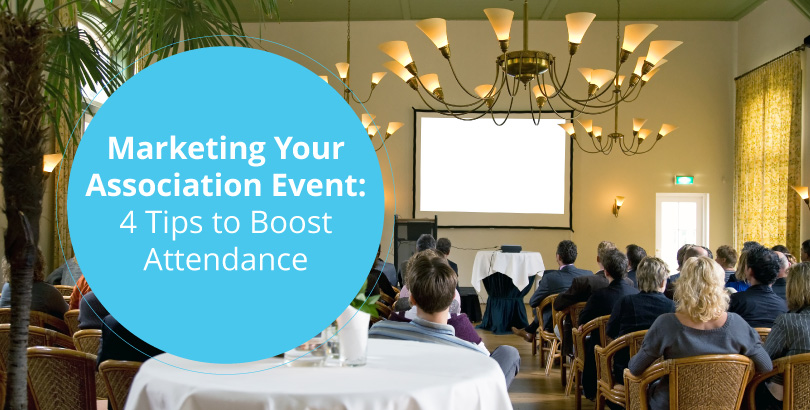Let’s say your association is hosting a gala, and the day of the event is just around the corner. Your team has spent months planning for the event by selecting a venue, booking vendors, and securing an influential keynote speaker. You’ve allocated a significant portion of your budget to the event, hoping to make a return through increased membership renewals and new member enrollments.
However, only a fraction of the attendees you hoped to attract purchased tickets to the gala. When the day of the event arrives, you’re left grimly staring at an attendance total that’s far below your association’s goal.
To attract more attendees to your event, your association must make a concerted effort to market to a targeted audience. After all, if you plan the perfect event but no one knows about it, it’s unlikely to have a positive impact on your organization. In this guide, we’ll explore the strategies your association can use to encourage more people to attend your next event:
- Identify and understand your target audience.
- Leverage omnichannel marketing.
- Optimize your website for visitors.
- Track the success of your marketing campaigns.
Kick off your campaign planning by digging into what you know about members. By leveraging the data stored in your association’s CRM, you can create targeted messages that appeal to members’ unique interests and expectations. Let’s get started!
Identify and understand your target audience.
Who is most likely to be interested in attending your event? Who would benefit the most from the opportunities and resources it has to offer? Additionally, what kinds of messaging and content will they respond well to?
These questions will help your team determine your target audience and the strategies used to capture their attention. NXUnite’s guide to event planning recommends creating an event attendee persona to help you target and relate to the audience you want to reach. Research indicates that this strategy is highly effective, revealing that 56% of the companies that use buyer personas have generated higher-quality leads.
When creating your attendee persona, or a fictitious person representing your ideal attendee, it should contain information like the attendee’s:
- Demographics: What is your ideal attendee’s age, gender, occupation, location, and income? Outline any other factors that may be relevant, such as educational background.
- Psychographics: Detail any hobbies, interests, and values you expect attendees to have. For example, if you are holding a golf tournament fundraiser, attendees should have an affinity for the sport.
- Communication preferences: Everyone has preferred ways to communicate. Determine which channels, such as social media or text messages, your target audience engages with most often based on historic response rates and market data.
- History with your association: Is the attendee a member or non-member? Have they attended any previous events? If they are members, how engaged are they?
- Goals: Pinpoint what attendees would want to gain or achieve by going to your event. This may be making new connections, learning a skill, or participating in group discussions or workshops. Then, promote event offerings that align with those goals.
Depending on the nature of your event and your target audience, you may need to expand your persona to include more detail or even create more than one. Remember that each factor you determine should inform marketing decisions.
For example, if the majority of your target audience belongs to older generations, you may focus more on communication channels like direct mail, emails, or phone calls.
Leverage omnichannel marketing.
Once you’ve identified who you’re trying to reach with your event marketing, you need to plan how you’ll reach them.
Omnichannel marketing involves seamlessly using multiple communication channels to promote your association. This allows you to reach prospective attendees across each of the channels and platforms they regularly use, establishing several touchpoints that nudge them toward registration. Because creating an effective omnichannel marketing strategy involves many moving parts, consider streamlining the process by using an effective association management platform that can automate messages and personalize mass communications to different member segments.
This software should also help you create and share content across several channels, including:
- Email: Send marketing emails to current members or interested prospects who submitted their contact information. Make sure to include event details, a list of the opportunities at the event, information about special deals, and a link to register. Consider segmenting your members based on interests or past event attendance. Then, tailor the messages to each of the segments for a more personalized approach.
- Social media: There are many creative ways to leverage popular social media platforms like Instagram, Facebook, and TikTok. For example, you can create clever hashtags related to the event or start a countdown campaign with daily or weekly updates. In general, keep the text in social media posts limited and use plenty of eye-catching images and other visuals.
- Print: This category includes channels like direct mail, flyers and other signage, and magazine or newspaper ads. Existing members might appreciate reminders to register delivered straight to their mailboxes. To reach new prospects, however, you may branch out into more public-facing options. If you are holding a large, in-person event like a gala or auction, for instance, consider creating targeted Google Ads for search terms related to your organization.
- Word-of-mouth: Make use of your existing network to reach your target audience by leveraging this powerful communication channel. Encourage event vendors, sponsors, and exhibitors to promote the upcoming event through their own communication channels. Additionally, you could reach out to influential, long-time members and encourage them to share about the event with their professional contacts.
It’s essential that each marketing message feels cohesive. Incorporate your association’s logo, brand colors, slogan, and voice into all of the content in the campaign. Additionally, ensure each communication leads back to the event landing page on your website.
Optimize your website for visitors.
When a member or prospective attendee spots one of your event marketing messages and stops to explore it further, you’ll want to set up a clear path to direct them to important event pages. For best results, you should link to a responsive, user-friendly website and event page.
Ideally, your association’s website should be:
- Mobile-friendly, using a responsive design that will fit any screen size
- Compliant with Web Content Accessibility Guidelines (WCAG)
- Easy to navigate, employing intuitive menus, logical page structures and hierarchies, links and buttons, and clear calls to action
- Search engine optimized for relevant keywords so it appears in search results
- Able to load quickly
- Secure, to instill trust and protect users’ data
Next, you’ll need to ensure that members who navigate to your website can easily find and access your event landing page.
While your marketing messages should direct your audience to the landing page, other members or prospects may arrive at your website’s homepage organically. In this case, direct them to the page by adding a link or button to the landing page on the homepage or giving the event a temporary spot in your main menu. For those who frequent your blog, write a post or two announcing the event and providing updates.
Track the success of your marketing campaigns.
To strengthen future event marketing campaigns, you need concrete data that demonstrates how these campaigns perform. By tracking relevant key performance indicators (KPIs), you can identify which strategies are succeeding, which are falling short, and how to improve.
Fonteva’s guide to member engagement strategies suggests analyzing the following KPIs to understand how successful your outreach strategies are:
- Social media: Measure changes in follower count, the number of comments and likes on posts, and which posts get the most attention.
- Email marketing: Track email open and click-through rates (CTR), how many members subscribe to your newsletter, and how often members respond to your correspondences.
- Live events: Analyze the number of registrants, total actual attendees, and the types of tickets people have bought (e.g., gold vs. platinum packages).
Leverage your association management software solution to track, analyze, and report these important metrics. This technology quickly and easily gives you a 360-degree view of the many different components of your event marketing and engagement strategies, paving the way for continued growth.
Events are a significant investment of time, effort, and resources for associations. Effectively marketing events to the right audience will help you recoup the expense of holding an event by increasing awareness of your association, inspiring new members to join, encouraging donations and sponsorships, and keeping current members engaged. These powerful event marketing techniques equip you with everything you need to begin increasing registration, attendance, and revenue for your future events.




